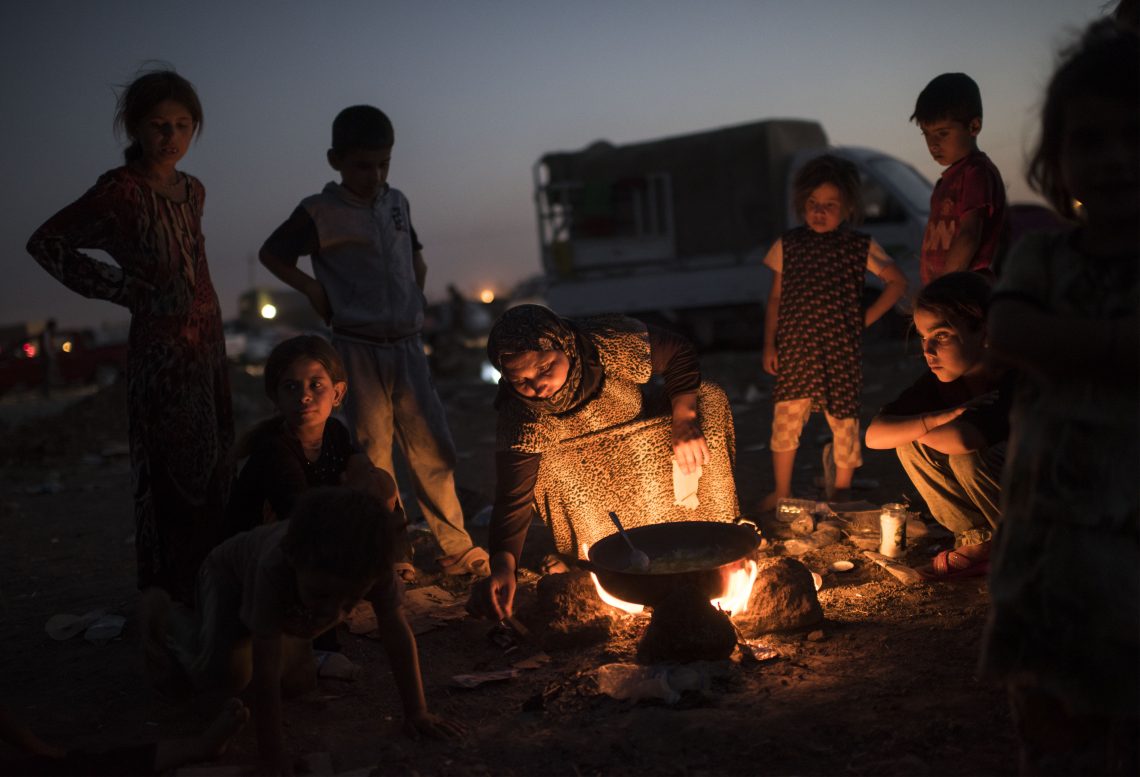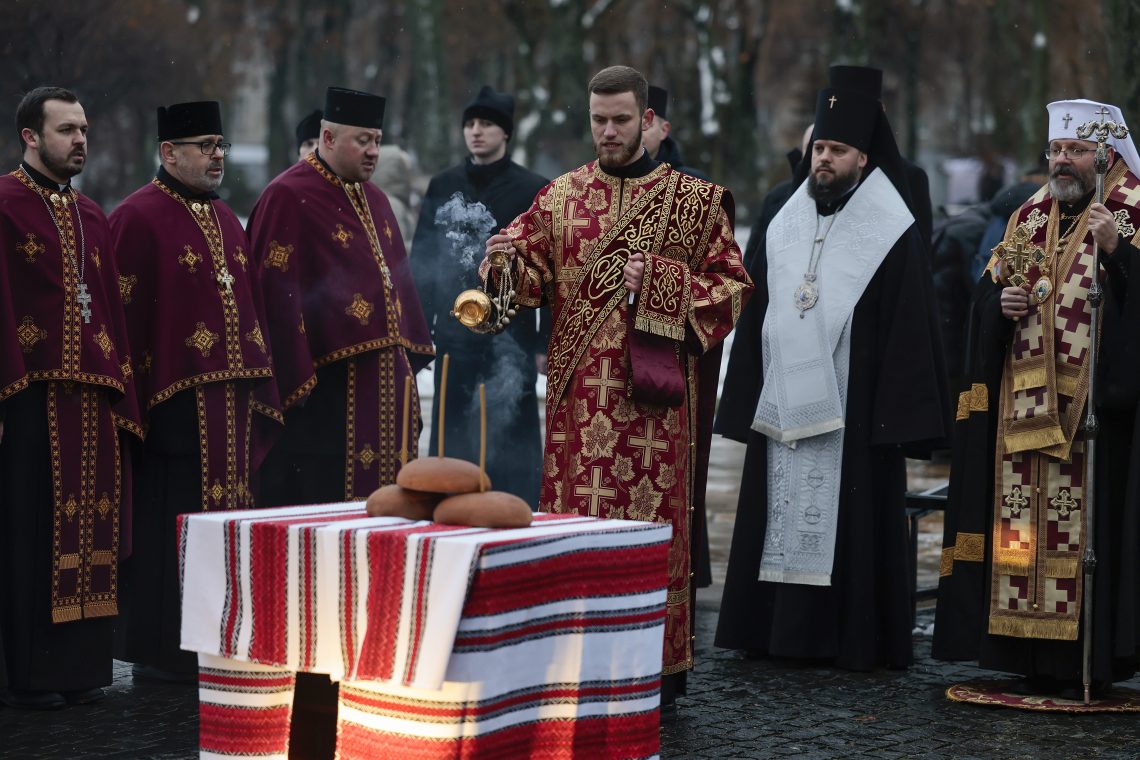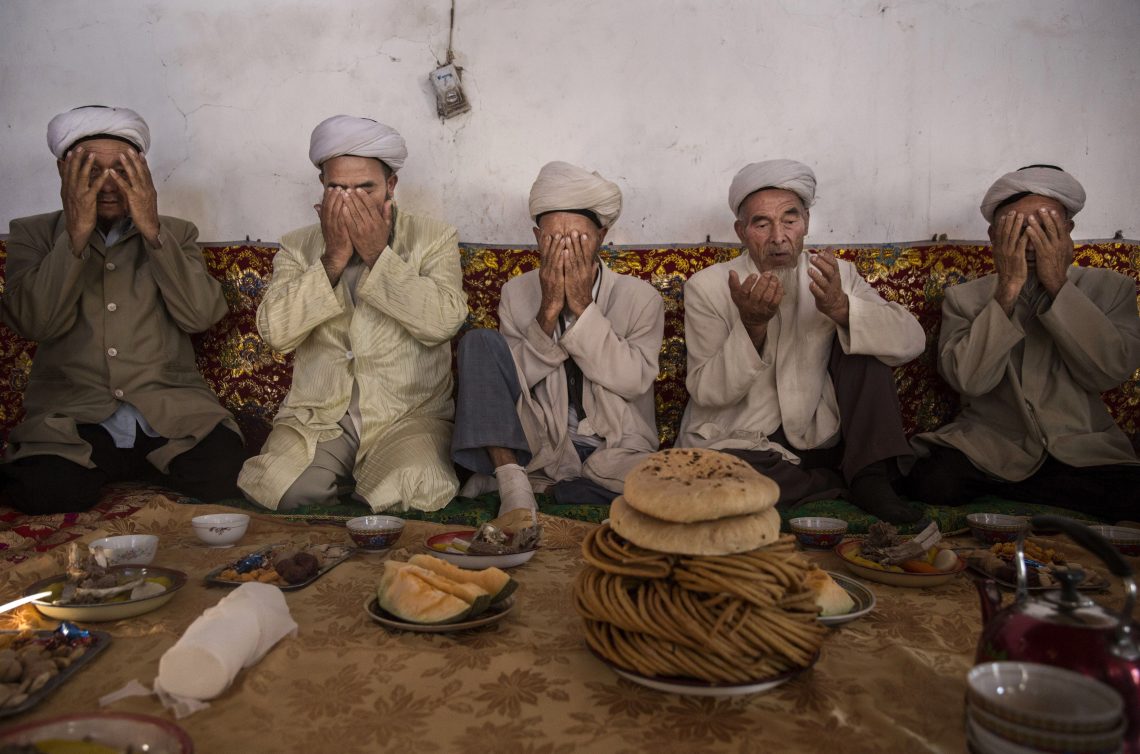The global crisis of religious persecution
From China and Iraq to Nigeria and North Korea, religious persecution remains a scourge well into the 21st century. Guaranteeing freedom of faith for all is a moral imperative, and would strengthen peace and stability worldwide.

In a nutshell
- Believers of all faiths continue to be victims of persecution
- Firsthand testimonials are key to documenting these crimes
- Religious freedom can support international justice and stability
According to one report, last year at least 360 million Christians experienced “high levels of persecution and discrimination.” Worldwide, 13 Christians are killed every day because of their faith, and 12 churches or Christian buildings on average are attacked. Muslims, Jews, Baha’i, Yazidis, Ahmadis, Hazara, Humanists and many others suffer in communities that show no respect for what the sadly deceased British Chief Rabbi Jonathan Sacks described as “the dignity of difference.”
Religious liberty is a cause that came looking for me, rather than the other way around. Of course, my own background, upbringing and subsequent role as a political representative helped opened my eyes to prejudice and persecution. One could hardly attend a grammar school named for Edmund Campion – or walk every day through Westminster Hall, where the Jesuit priest and Thomas More stood trial before being executed – and remain unaware of the kind of price paid over 400 years ago for one’s faith. “The king’s good servant, but God’s first,” as More insisted.
That this wasn’t just history came home to me in 1979, not long after entering the House of Commons, when I was approached by Danny Smith, a man working to free seven Siberian Pentecostal Christians who had taken refuge in the American Embassy in Moscow. It took five years – and interventions from Ronald Reagan, Margaret Thatcher and Pope John Paul II – before they were allowed to leave the Soviet Union.
In addition to being able to celebrate their freedom, something instructive happened – something that would recur repeatedly throughout my life.
They were among the countless individual cases who exposed me to the individual suffering that persecution causes: Jewish Soviet refuseniks Marsha and Vladimir Slepak, Russian artist Valeri Barinov, Romania’s Georgi Calciu, China’s Cheng Guang Chen, Pakistan’s Asia Bibi, Sudan’s Meriam Ibrahim, Vietnam’s Thaddeus Van Ly, Nigeria’s Leah Sharibu, the Yazidi activist Nadia Murad, Pastor Wang Yi and Zhang Zhan, and the Dalai Lama, to whom I presented a fellowship at my university in Liverpool.

These people also forced me to start to listen more closely for a canary in a coal mine: those whose warnings of terrible danger to entire communities were being ignored. Individual cases must bring us to address the more fundamental issues of how and why such suffering happens in the first place.
When you ignore discrimination, you should not be surprised when it morphs into persecution; and when you ignore that, atrocities, crimes against humanity and even genocide will be waiting in the wings.
Read more from Lord David Alton of Liverpool
Prospects for democratic capitalism
Witness to discrimination
Early on, I realized that we would have to form alliances and be willing to go and see for ourselves; to collect the evidence, and not merely rely on press and secondhand reports. When we put our hands into one another’s wounds, we are profoundly affected. Meeting those who have been beaten, tortured, imprisoned, raped or bereaved never leaves you unchanged.
Out of the first endeavors for the Siberian Seven and Valeri Barinov blossomed the Jubilee Campaign in Parliament, receiving endorsements from all the political leaders and commitments from over 100 lawmakers of all parties to sponsor individual victims of persecution.
I got to know the remarkable Canon Michael Bordeaux, founder of Keston College, who monitored the plight of the suffering church behind the Iron Curtain. He described how church leaders and parliamentarians would ignore the persecuted, hiding behind the excuse that “intervening will only make their situation worse.”
Wherever I have traveled – from Darfur to the Congo, Laos and Vietnam to Tibet and China, Pakistan, Nepal and India, Burma, Iraq, North Korea and elsewhere – people have repeatedly pleaded that their stories should be documented and known.

Edith Stein, the German Jewish philosopher murdered by the Nazis, was right: “Those who remain silent are responsible.” The importance of firsthand encounters and of speaking out was first forcibly brought home to me one chilly night in 1986 at Mostyska, on the Polish border with the former Soviet Union (now today’s Ukraine).
Ordered off the train and kept overnight, three of us eventually made it to Lviv. There we met Ivan Gel, the chairman of the Committee for the Defense of the Greek Catholic Church who had spent 17 years in prison. Bishop Pavlo Vasylyk had been incarcerated for 18 years, and another young priest was caught illegally celebrating the liturgies and had just returned from his punishment: six months at Chernobyl clearing radioactive waste, without any protective clothing.
We met people whose family members in the preceding generation had lost their lives in the Holodomor, Stalin’s mass starvation of Ukraine. We visited churches the Soviet dictator had closed 40 years earlier – and where, every day, fresh flowers were defiantly laid to replace those removed the day before by the regime’s soldiers.
People wanted their stories known, and we helped get those stories told.
On our return, Jubilee organized prayer vigils, letter-writing campaigns and parliamentary action. Along with ITN, we persuaded BBC Newsnight to broadcast our film material. In small ways, the world knew a little more about what was happening in Ukraine.
Inevitably, since Russian President Vladimir Putin commenced his illegal war in Ukraine, I have often thought about how religious freedom was so violently repressed there and about the courage and bravery of Ukraine’s anti-Soviet pro-democracy movement. Many of its leaders had a deep faith, and, like their counterparts in Hong Kong today and elsewhere, suffered grievously. It is part of their DNA and helps explain why the present war is not merely about territory, but about the very soul of a nation.
No excuses
After the collapse of the Soviet Union, our work refocused on the suffering of believers in the Islamic world and the Far East.
In a military zone in southeast Turkey, I saw firsthand the plight of the Chaldean and Syrianni Christians and the Kurds. I took evidence from the Coptic Christians of Egypt, including His Holiness, Pope Shenouda III.
In 2019, with Christian Solidarity Worldwide, I returned to the region, and in Northern Iraq took personal accounts of the genocide against the Yazidis and Christians. In 2014, Islamic State launched a violent attack against the Yazidis in Sinjar. The group then attacked the Christian villages of the Nineveh plains, forcing some 120,000 people to flee for their lives in the middle of the night. Thousands of men were killed; boys were forced to become child soldiers; and thousands of women and girls were kidnapped into sexual slavery. Just weeks ago, I once again raised with the UK government the plight of 2,763 of those women and children who are still missing.
This barbarism was inspired by a religious jihad against a people of a different religion. In the perpetrators’ minds, this justified murder, imprisonment, enslavement, torture, abduction, exploitation, abuse, forced conversion, marriage and rape. In Germany, in recent months, two ISIS women were jailed for keeping Yazidi girls as slaves. There have been convictions for genocide even as the UK continues to refuse to recognize the events as genocide; some weeks ago, the government opposed my amendment to open a safe and legal route to provide asylum for people of faith or belief.
In a world of information overload, we must ensure that these stories do not disappear into the ether.
During my visit to Iraq, I went to Simile, where in 1933, over 6,000 Assyrians were killed and over one hundred Assyrian villages were destroyed and looted – its people meeting the same fate as the Armenians.
It was a study of the Simile massacre that led a Jewish-Polish lawyer, Raphael Lemkin, to begin his work on what would become the Genocide Convention – tragically, though, not before more than 40 of his family were murdered in the Holocaust.
Human rights work on religious freedom also took me and an American member of Congress to Vietnam, Laos and Burma (now Myanmar). I entered Burma (illegally) to see the scale of the suffering among the Karen people. Following the present-day military coup, it is sadly happening all over again.
On four occasions I also went to North Korea, leading to more reports, a book, the formation of an All-Party Parliamentary Group (APPG) – and to a young man, Timothy Cho, arriving one day at my university office.
Once again, it is impossible to hear a personal account – Timothy’s story of torture, imprisonment, escape and faith – and not want to take action on behalf of the people of this prison state, one described by a United Nations commission as “a state without parallel.”

China – which, like Iran, has sanctioned me – persecutes its own people, and in contravention of the Refugee Convention returns escaping believers to prison camps or death sentences in North Korea.
Last year, Dr. Bob Fu – who survived the 1989 Massacre in Tiananmen Square, and escaped the country – introduced me to Ovalbek Turdakun, a Kyrgyz Christian who was incarcerated with over one million Uighur Muslims. Kept in a windowless cell with 23 other inmates, he was strapped to a “tiger chair,” forced into starvation and subject to dubious medical procedures.
Religious persecution is a hallmark of the Chinese regime. Think of Tibet’s Buddhists; Xinjiang’s Uighur Muslims; Chinese Christians and Falun Gong practitioners. Think of the arrest in once-free Hong Kong of the venerable Cardinal Joseph Zen, and the targeting of Christian lawyers and pro-democracy advocates like Martin Lee and Jimmy Lai.
William Wilberforce once famously said that once the facts had been laid before the House of Commons, no one could any longer use the excuse that they did not know.
In a world in which, if anything, there is an information overload and a disproportionate preoccupation with trivia, we must ensure that these stories do not disappear into the ether.
The importance of documentation and cataloging evidence was brought home to me again recently at a Westminster meeting of the APPG on Freedom of Religion or Belief, which I cofounded and which is now one of the biggest APPGs at Westminster. MP Fiona Bruce, the prime minister’s special envoy for freedom of religion and belief, chaired the launch of our new report detailing the continuing depredations in Nigeria. At least 300 Christians, including three clergy, have been murdered by Islamists since May.
Three years ago, I promised a visiting Rebecca Sharibu to recount how her 14-year-old daughter, Leah, had been abducted by Islamists, and that we would not be silent about Leah’s fate and the attempts to forcibly convert, rape and impregnate her. Now 20 years old, she is still held captive.
In the aftermath of the Pentecost killings last year – which left 41 dead and dozens injured in the church of St. Francis Xavier – I chaired a meeting for the diocesan bishop of Ondo, Bishop Jude Arogundade. He warned British officials against again disingenuously attributing the jihadist murders of thousands of Nigerians by Boko Haram and ISIS West Africa to “climate change.” Such meetings and reports contest misleading narratives, and force the issue of religious freedom onto the agenda.

The deadliest poison
In a world where four out of five people hold religious beliefs, this is hardly a fringe issue. More, the denial of religious liberty is a harbinger: Those countries that deny religious freedom are serial human rights abusers, likewise denying many other human rights. It is a litmus test; nations that uphold religious liberties uphold other liberties, too.
How do we change things? We are already changing things – but it requires painstaking, Herculean efforts.
Thanks to the help and expertise of Notre Dame University’s Law School and its religious freedom initiative, we have begun to challenge persecuting countries through the courts – in the case of China, for instance, for breaching the Genocide Convention in its treatment of the Uighur Muslim minority.
In the UK Parliament, what we do is organize meetings. We have produced reports about Hazara, Darfur, North Korea, the Uighurs, Rohingya, Tibet and the Yazidis – all of which require granular detail and serious work. These documents have led to debates and questions in Parliament, speeches, letters and sessions with ministers. Crucially, it also defeats the lazy excuse that officials and ministers “did not know.” And, sometimes, it leads to action through our aid programs – though nowhere near enough.
But this is the time-honored way in a democracy, just as Wilberforce and the Quaker ladies did as they challenged slavery laws. They knew you had to change hearts, change minds, change attitudes and change political priorities to change laws.
When you ignore discrimination, you should not be surprised when it morphs into persecution; when you ignore that, atrocities, crimes against humanity and even genocide will be waiting in the wings.
Seventy five years ago – after the genocide on the European continent, the Holocaust of the Jewish people – the world promulgated both the Genocide Convention and the Universal Declaration of Human Rights, including Article 18 on freedom of religion or belief.
The guarantee of religious freedom can support international justice, stability and peace. There is also a correlation between the most prosperous happiest societies and those that promote religious freedoms. Religious liberty is not just a nice-to-have. This too-often neglected, orphaned right needs people to nurture, uphold and encourage its growth.
The goal must be to achieve religious freedom for everyone, everywhere, whoever they may be. We each have an inalienable right, flowing from our nature as human beings, to believe in religious truths or, uncoerced, not to do so.
We have the right to freely come together in community with others, to worship in the tradition which we have embraced and to create holy spaces and places and schools in which to foster our children. It is the duty of those who hold that each person is made in the image and likeness of our Creator to defend civil, democratic and political rights, to uphold the law and especially to defend the voiceless and most vulnerable of God’s children.
As Maximilian Kolbe, a victim of the Nazis, once wrote, “The deadliest poison of our age is indifference.” Let that never be said of us.








